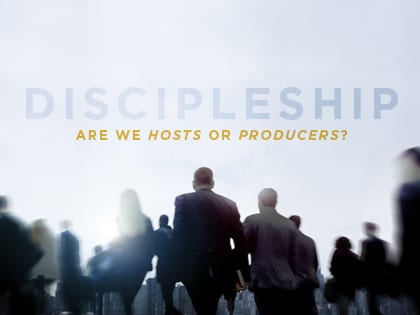Ask a church leader where they fall on the spectrum of interpreting the Great Commission and you’re likely to get their thoughts on one word: disciples. As churches interpret what it means to be a disciple, some feel the pressure to choose sides between evangelism and teaching. Are we going to gear ourselves toward reaching seekers? Or help believers go deeper? And many churches who seek a balance then struggle with the tension of making them both happen.
Certainly the church has a responsibility for discipleship—that’s a given. We’re called to teach what is appropriate to sound doctrine (Titus 2:1), to teach truths to trustworthy people who will be able to pass them on to others (2 Tim. 2:2), to lead by example as imitators of Christ (Eph. 5:1) and more.
But I believe we have more to gain in our interpretation of the Great Commission if we back up a few characters and focus on a different word: make. The verb is where the action is, and as church leaders we have much to gain by examining what that looks like. I’d argue that the tension isn’t as much between evangelism or discipleship, but how actively we participate in both.
Evangelism and the Host
When it comes to evangelism, many of us understand there’s a limit to how far we can take things ourselves. As a church, we can create an environment where people feel welcomed, where they will be challenged with the truth and where they will hear the gospel. Personally, we can build a friendship, listen to their struggles, invite them to church and share the gospel with them directly.
We can do everything within our power to bring people into a relationship with Jesus, and yet we can’t make it happen. In God’s beautiful plan, he gives each individual a choice. In that moment it all comes down to the Holy Spirit working in the life of that person and how they respond. That’s when the real transformation takes place.
We’re privileged to play the role of host in that process. And anyone who’s hosted people in their home knows that no matter how much we pour our hearts into an experience, we can’t dictate the outcome for our guests. They might have something else on their mind all night. They might be tired or ill. They might be in a hurry to go to another party (ouch!). We can’t make them have a good time any more than we can make people grow.
Discipleship: From Host to Producer?
And yet, as soon as someone makes the decision to follow Christ, so many church leaders feel a mandate to step back in and take the reins. We roll up our sleeves and give God a nod as if to say, “OK, nice work, Holy Spirit. You did your part and we’ll take the spiritual development from here.” It’s as if there’s an invisible pivot point between accepting Christ and growing in Christ that puts the church back in charge.
As church leaders, we’re tempted to cast ourselves in the role of discipleship producer. We take the individual and God out of the process and treat discipleship like a workflow that’s ours to manage.
I think we have to ask ourselves why we might be inclined to shift from the role of host to producer. Do we trust the Holy Spirit with transformation, but only up to a point? Do we think we’re shirking our responsibility if we’re not making sure someone takes each step on a linear path? What makes us view discipleship as something that has a finish line anyway?
God is the one who grows people. We don’t own the transformation. Instead of being the producer who’s trying to call the shots, we get to be a host to discipleship by creating fertile ground for God to do what God does.
A New Mindset
What could happen if we shifted our mindset to one that trusts the Holy Spirit equally for evangelism and discipleship? What concepts for discipleship might emerge if we think differently about our role in it?
Maybe you’ll start to position serving as a discipleship opportunity since it gives us experience putting others first. Maybe your local or global missions efforts can help people grow as they gain awareness of God at work around the world. You might read through a Bible reading plan together as a church. Perhaps you’ll begin equipping and encouraging people to actively share the gospel. Or maybe you’ll develop a new model to connect people in relationships that foster growth.
The key here is an adjustment in perspective that might inspire new environments, lead us to realign opportunities or even to do the same things we’ve been doing with a different kind of clarity. When discipleship is a multifaceted process that God leads, a person’s path can be as unique as the one-of-a-kind creation that they are.
Read more from Bobby Gruenewald »
Bobby Gruenewald is pastor, innovation leader at Life.Church. Connect with him on Twitter: @BobbyGwald

